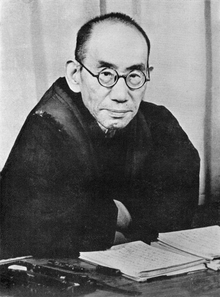Nishida Kitarō


Nishida Kitarō (jap. 西田 幾多郎; * 19. Mai 1870 z Mori, Kanazu (heit: Kahoku; † 7. Juni 1945 z Kamakura) wor a berihmta japanischa Philosoph. Ea is da Grinda vo da philosophischn Richtung gwen, wo spoda ois de Kyōto-Schui bekannt worn is. Mit eam beginnt de modeane japanische Philosophie.
Lebm
[Werkeln | Am Gwëntext werkeln]Da Nishida kimmt aus ana oidn Samuraifamij. Sei Muada wor a strengglaibige Buddhistin, sei Voda wor da Buagamoasta im Dorf. Da Nishida hod in Tokyo Philosophie studiat und spoda aa no deitsche Literatua. Ea hod si aa intensiv mit eiropejischa Philosophie befosst, bsondas aa midm Schopenhauer.
Vo 1896 bis 1910 hod a ois Leara an Obaschuin gorwat. Vo 1897 o hod a si in Zen-Meditation untaweisn lossn. Vamuatli ogregt duach sein friaran Schuikamaradn Daisetz Teitaro Suzuki, dea wo spoda a wejdberihmta Zen—Autor worn is. 1910 is da Nishida nacha an de Universitet Kyoto beruafa worn, wo ra 1914 Professor fia Philosophie worn is. Do hod a aa de Kyoto-Schui grindd.
Da Kitaro hod 8 Kinda ghobt, via davo san vor eam gstorm. Zan Dod vo seim easchtn Suhn hoda des foigende Waka Gedichtl gschriem:
- Hod do glebt
- gsund und froh
- bis dreiazwanzge
- fia wos isa vaschwundn
- wia ra draam
- (Yusa 2002, 314–18)
Philosophie
[Werkeln | Am Gwëntext werkeln]S berihmtaste Konzept in da Philosophie vom Nishida is de Logik vom Basho (jap. 場所; "Logik vom Ort" oda "Logik vom Topos"). Dees is a non-dualistische, konkrete Logik, wo de Subjekt-Objekt-Logik vom Aristoteles und Kant, duach de Bejohung vo da absolut widasprichlichn Sejbstidentität, iwawindn soi. So entsteht a Spannung vo Gegnsätzen, de wo owa ned duach Synthese (wia ba Hegel) iwawunden wead, sondan duach de dynamische Spannung sejm. Dees Subjekt, da Oanzlne, is fia de Bedeitung vo da Woarheit vom Urtei ned relevant. Unta "Sein" vasteht da Nishida "sein Ort hom" und daduach "bestimmt sein".
Um de subjektive Dialektik z iwawindn bringt da Nishida s Konzept vom "Absolutn Nix" (絶対無, zettai mu) eine. Dees Sejbst vaweist ned af an weidan Ort, sondan is sejm sei Ort, wo ned begriffa wean ko. S Nix is a Ort und da Ort is Nix.
Weak
[Werkeln | Am Gwëntext werkeln]- Nishida Kitarō zenshū (Gsammete Weake, 1966)
- Shisaku to taiken (Dengn und Eafoarung, 1915)
- Jikaku ni okeru chokkan to hansei (Anschaung und Reflexion im Sejbstbewusstsein, 1917)
- Ishiki no mondai (Das Problem vom Bewusstsein, 1920)
- Geijutsu to dōtoku (Kunst und Moral, 1923)
- Hataraku mono kara miru mono e (Vom Handlnden zan Sengandn, 1927)
- Ippansha no jikakuteki taikei (Des sejbstbewusste System vom Oigmoana, 1930)
- Mu no jikakuteki gentei (De selbstbewusste Bestimmung vom Nix, 1932)
- Tetsugaku no kompon mondai (Grundlegende Probleme vo da Philosophie, 1933-34)
- Testgaku rombonshū (Sammlung vo philosophischn Essays, 1935-46)
- Bashoteki ronri to shūkyōteki sekaikan (De Logik vom Ort und de religiese Weltanschaung, 1945)
- Yotei chōwa wo tebiki toshite shūkyōtetsugaku (Aufm Weg za oana Philosophie vo da Religion unta da Leitung vom Begriff vo da prästabilisiatn Harmonie, 1944)
Ins Deitsche iwasetzt
[Werkeln | Am Gwëntext werkeln]- Zen no Kenkyū (Über das Gute, Frankfurt a. M. 1989)
- Logik des Ortes (Iwasetzt und aussabem vom Rolf Elberfeld), Darmstadt, 1999. ISBN 3-53413-703-5
- Selbstidentität und Kontinuität der Welt. In: Die Philosophie der Kyôto-Schule. Hrsg. v. Ryôsuke Ohashi. S. 54-118. Alber, Freiburg / Minga 1990. ISBN 3-495-47694-6
- Das künstlerische Schaffen als Gestaltungsakt der Geschichte. In: Die Philosophie der Kyôto-Schule. Hrsg. v. Ryôsuke Ohashi. S. 119-137. Alber, Freiburg / Minga 1990. ISBN 3-495-47694-6
Literatua
[Werkeln | Am Gwëntext werkeln]- Lydia Brüll: Die japanische Philosophie: eine Einführung. WBG, Darmstadt 1989. ISBN 3-534-08489-6
- Peter Pörtner, Jens Heise: Die Philosophie Japans. Von den Anfängen bis zur Gegenwart. Kröner Verlag, Stuttgart 1995, S. 347-356.
- Robert E. Carter: The Nothingness beyond God. An Introduction to the Philosophy of Nishida Kitaro. Paragon House Publishers, St. Paul 1997, ISBN 1-55778-761-1
- Thomas Latka: Topisches Sozialsystem. Die Einführung der japanischen Lehre vom Ort in die Systemtheorie und deren Konsequenzen für eine Theorie sozialer Systeme. Carl-Auer-Systeme Verlag, Heidelberg 2003, S. 27-63.
- Ryôsuke Ohashi: Vom Selbstwissen zur Ortlogik. Nishida und die Phänomenologie. In: Metamorphose der Phänomenologie. Dreizehn Stadien von Husserl aus. S. 58-85. Alber Freiburg / Minga 1999. ISBN 978-3-495-47855-4
- Yusa, Michiko, 2002, Zen & Philosophy: An Intellectual Biography of Nishida Kitarō, Honolulu: University of Hawai'i Press.
Im Netz
[Werkeln | Am Gwëntext werkeln]- John Maraldo: Eintrag in da Stanford Encyclopedia of Philosophy (englisch, inklusive Literatuaogobm)
- Literatur von und über Nishida Kitarō im Katalog der Deutschen Nationalbibliothek
Text is available under the CC BY-SA 4.0 license; additional terms may apply.
Images, videos and audio are available under their respective licenses.
